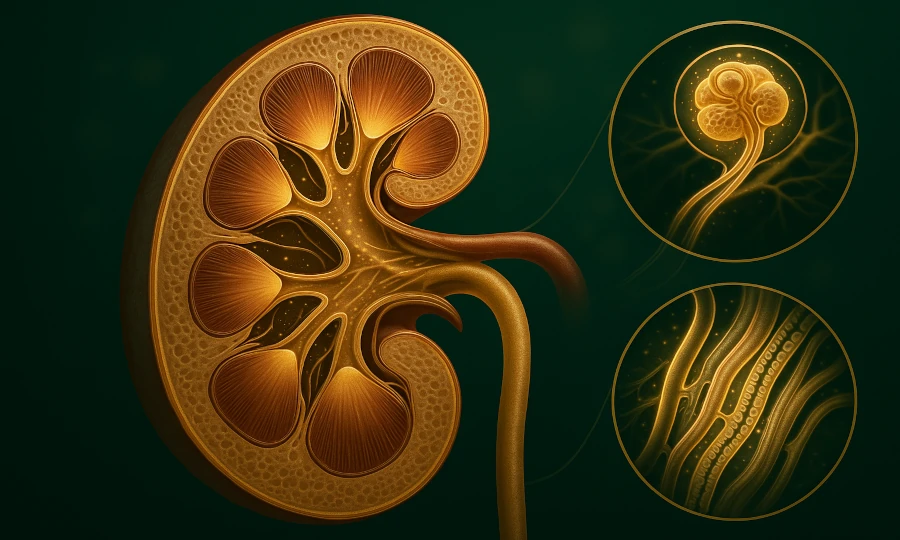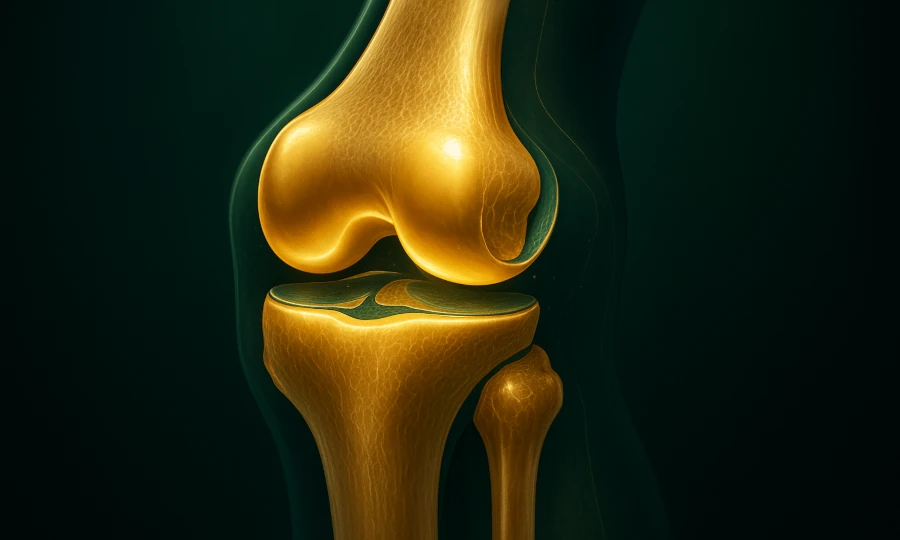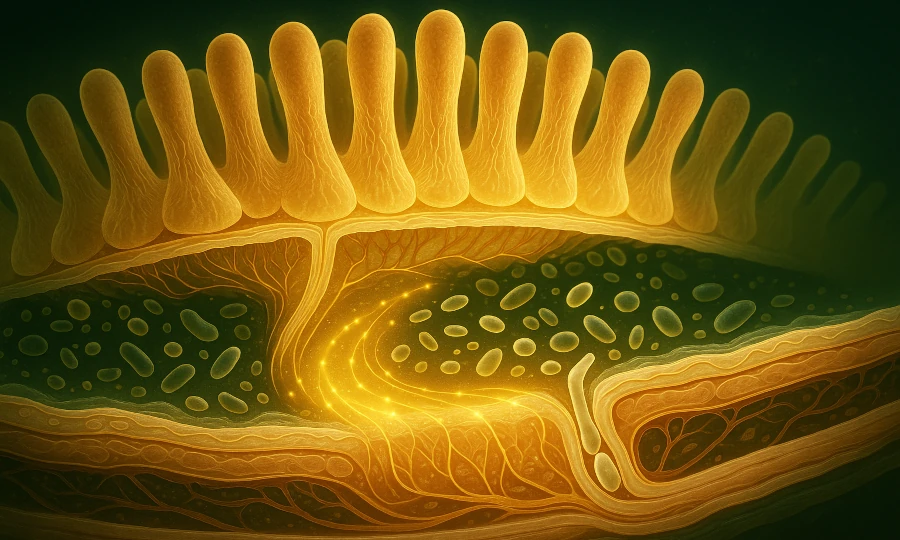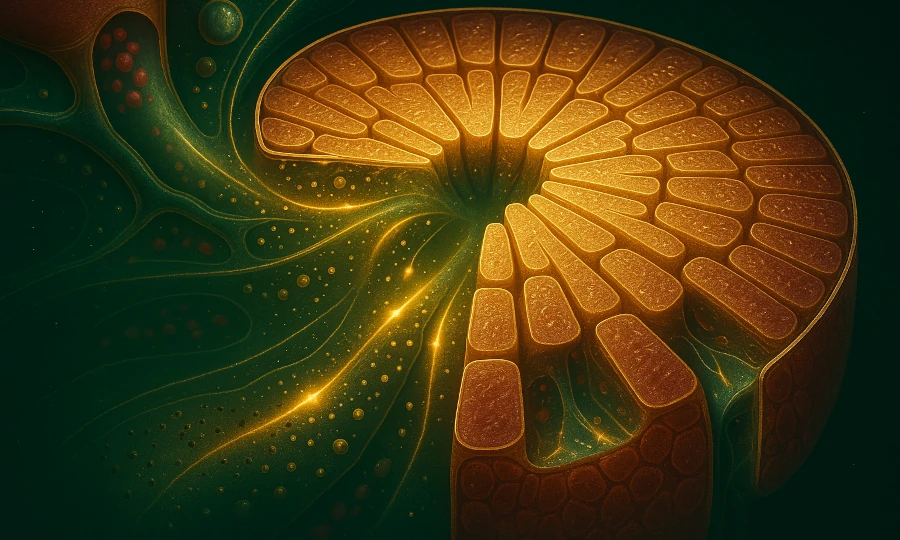
Kidneys represent a masterpiece of nature – two unassuming organs that tirelessly filter our blood, remove waste products, and maintain the delicate balance of fluids, electrolytes, and minerals in our body. Each day, kidneys filter approximately 180 liters of blood and produce about 1.5-2 liters of urine containing waste substances and excess minerals. In today's world, however, kidneys and the urinary system face many challenges – from inadequate hydration and unbalanced diet to excessive medication use, environmental toxins, and chronic stress.
Comprehensive Support for Healthy Function of Kidneys and Urinary System
Roanga Infinity® contains plant extracts, minerals, and bioactive substances that contribute to the natural function of kidneys and urinary tract. It thus supports fluid balance in the body and natural detoxification processes.
Modern scientific research suggests that optimal function of kidneys and urinary system depends on the interplay of several key factors:
- Healthy microcirculation in kidney glomeruli and tubules
- Optimal function of the filtration barrier and epithelial cells
- Effective elimination of metabolic waste products and toxins
- Natural regulation of acid-base balance and electrolytes
- Healthy function of excretory pathways and urinary bladder
Herbal Cleansing for the Urinary Tract
A healthy urinary tract is key for effective elimination of waste products and maintaining optimal function of the entire excretory system. Traditional herbs have served as natural support for these processes for centuries.
Black walnut, clove, and wormwood are traditionally used to support the digestive and excretory system and contribute to the body's cleansing processes. A systematic review published in the Journal of Ethnopharmacology (2018) documents that these traditional herbs can support a healthy environment in the urinary tract and contribute to optimal function of the excretory system (Wang et al., 2018).
These natural herbs can help:
- Support a healthy environment in the urinary tract
- Contribute to optimal function of excretory pathways
- Support natural cleansing processes of the organism
- Contribute to maintaining healthy microflora of the urogenital system
Support for Natural Filtration
Blood filtration in the kidneys is a sophisticated process that requires optimal function of glomeruli – microscopic filtration units composed of specialized capillaries and epithelial cells. Healthy liver and kidney function are interconnected and together form the main detoxification axis of the organism.
Milk thistle and garlic help maintain normal liver and kidney function, which together ensure natural detoxification and balance of the organism. Scientific studies suggest that bioactive compounds from these plants can support microcirculation in the kidneys and contribute to protecting filtration structures from oxidative stress (Rafieian-Kopaei et al., 2017, Journal of Renal Injury Prevention).
These traditional herbs can help:
- Support healthy microcirculation in the kidneys
- Contribute to protecting kidney structures from oxidative damage
- Support optimal function of detoxification enzymes
- Contribute to effective elimination of metabolic waste products
"Kidneys are the silent guardians of inner balance, tirelessly working to maintain an optimal environment for all cells in our body. Natural bioactive substances can support these vital organs and contribute to their optimal function in the challenging conditions of the modern world."
Antioxidant Protection of Cells
Kidneys are metabolically very active organs with high oxygen consumption, which makes them vulnerable to oxidative stress. Protecting kidney cells from damage by free radicals is important for maintaining optimal filtration and reabsorption function.
OPCs from grapes, fucoidan, and lycopene help protect kidney and urinary system cells from oxidative stress. Scientific studies suggest that these natural antioxidants can support kidney cell health and contribute to optimal function of detoxification mechanisms (Cho et al., 2016, Oxidative Medicine and Cellular Longevity).
These natural antioxidants can help:
- Protect kidney cells from oxidative damage during filtration processes
- Support natural renewal of kidney epithelium
- Contribute to maintaining optimal function of filtration membranes
- Contribute to regulation of inflammatory processes in kidney tissue
- Support optimal mitochondrial function in kidney tubule cells
Overall Balance and Resilience
The function of kidneys and urinary system is closely connected with the overall vitality and resilience of the organism. Chronic stress, fatigue, and weakened immunity can negatively affect excretory functions and contribute to imbalance.
Reishi, ginseng, and bioactive peptides from deer velvet support vitality and overall resilience of the organism, which also contributes to maintaining healthy functions of the urinary system. A study published in the Journal of Traditional and Complementary Medicine (2019) suggests that adaptogenic properties of these traditional mushrooms, herbs, and bioactive substances can support the body's natural resilience to stress and contribute to overall homeostasis (Li et al., 2019).
These traditional adaptogens and bioactive substances can help:
- Support the organism's natural resilience to stress, which can affect kidney function
- Contribute to optimal energy balance of kidney and urinary system cells
- Support healthy immune response in the urogenital tract
- Contribute to overall neuro-endocrine balance of the organism
Holistic Approach to Kidney and Urinary System Health
Kidney and urinary system health is the result of a complex interplay of many bodily systems and processes. Modern scientific findings confirm that optimal support requires a holistic approach that focuses on key aspects of renal function – from supporting microcirculation through protecting filtration structures to regulating acid-base balance and eliminating waste products.
Roanga Infinity® offers comprehensive natural support that combines traditional wisdom with modern scientific knowledge. Carefully selected natural substances work in synergy and can contribute to the natural balance and vitality of kidneys and urinary system, which is reflected in overall health and energy of the organism.
Note: Roanga Planet products are dietary supplements that can contribute to supporting natural processes in the body. They are not intended to diagnose, treat, cure, or prevent any disease.
Frequently Asked Questions about Kidneys and Urinary System
How does the filtration process work in the kidneys?
The filtration process in the kidneys is a fascinating and highly sophisticated mechanism that takes place in microscopic structures called nephrons. Each kidney contains approximately one million nephrons, with each nephron beginning with a glomerulus – a cluster of specialized capillaries surrounded by Bowman's capsule. Filtration begins when blood flows into the glomerular capillaries under high pressure. The walls of these capillaries function as a selective filter that allows the passage of water, electrolytes, glucose, amino acids, and small waste substances (such as urea and creatinine) into Bowman's capsule, while retaining blood cells and large proteins. This filtrate then enters a system of tubules where selective reabsorption of useful substances back into the blood and secretion of additional waste substances from the blood into the tubules occurs. In the proximal tubule, about 65% of the filtrate is reabsorbed, including water, sodium, chloride, potassium, calcium, phosphates, glucose, and amino acids. The loop of Henle, which follows, plays a key role in concentrating urine through a countercurrent multiplication system. The distal tubule and collecting duct then fine-tune the composition of urine under the influence of hormones such as aldosterone and antidiuretic hormone (ADH). The resulting urine contains waste products, excess ions, and water, and is carried from the kidneys through the ureter to the urinary bladder. This entire process is remarkably efficient – the kidneys filter about 180 liters of primary filtrate daily but produce only 1.5-2 liters of final urine, which means that more than 99% of the filtrate is reabsorbed. This complex mechanism allows the kidneys to precisely regulate the volume and composition of body fluids, maintain acid-base balance, and remove waste products while preserving valuable nutrients.
What is the relationship between hydration and kidney health?
The relationship between hydration and kidney health is fundamental and multifactorial. Adequate fluid intake is essential for optimal kidney function for several reasons. First, sufficient hydration ensures adequate blood flow to the kidneys, which is crucial for effective filtration and removal of waste products. With insufficient hydration, blood flow to the kidneys decreases, which can lead to less effective filtration. Second, adequate fluid intake helps dilute urine, which reduces the concentration of potentially harmful substances and minimizes the risk of kidney stone formation. Concentrated urine may contain higher levels of minerals and waste products that can crystallize and form stones. Third, sufficient hydration supports regular emptying of the urinary bladder, which helps flush out bacteria and reduce the risk of urinary tract infections. Fourth, chronic mild dehydration can contribute to kidney damage in the long term, especially if combined with other risk factors such as diabetes or hypertension. On the other hand, excessive fluid intake can overburden the kidneys, especially in individuals with existing kidney disease. Optimal fluid intake is individual and depends on many factors, including age, gender, weight, physical activity, climatic conditions, and overall health status. Generally, fluid intake that leads to light yellow urine is recommended. In addition to quantity, the quality of consumed fluids is also important. Water is an ideal choice, while excessive consumption of beverages high in sugar, caffeine, or alcohol can have negative impacts on kidney health.
How can natural substances support kidney health?
Natural substances can support kidney health through several different mechanisms that complement each other and create comprehensive support for optimal renal function. Antioxidants, such as polyphenols from grape seeds (OPC), lycopene from tomatoes, or flavonoids, can protect kidney cells from oxidative stress, which is elevated during metabolic processes in the kidneys. These substances neutralize free radicals and support the natural antioxidant capacity of cells. Some herbs, such as milk thistle, contain compounds (e.g., silymarin) that can support detoxification enzymes and contribute to protecting kidney cells from toxins. Anti-inflammatory substances, such as omega-3 fatty acids, curcumin, or certain triterpenes from reishi mushrooms, can modulate inflammatory processes in the kidneys. Chronic inflammation can without causing dehydration or electrolyte imbalance. Prebiotic substances can support a healthy gut microbiome, which is increasingly recognized as an important factor influencing kidney health through the so-called "gut-kidney axis." It is important to note that natural substances should be used as part of a holistic approach to kidney health, which includes adequate hydration, balanced diet, regular physical activity, and avoiding known risk factors such as smoking or excessive alcohol consumption.
What is the relationship between liver and kidney function in detoxification processes?
The liver and kidneys function as the main detoxification tandem in the human body, with each organ having specific but complementary roles. The liver is the primary organ for biotransformation of xenobiotics (foreign substances) and endogenous toxins. Two main phases of detoxification occur in the liver: Phase I (transformation), where cytochrome P450 enzymes modify toxins through oxidation, reduction, or hydrolysis, and Phase II (conjugation), where intermediates are combined with molecules such as glutathione, glucuronic acid, or sulfates, which increases their water solubility. The kidneys then play a key role in eliminating these water-soluble metabolites from the body. They filter the blood and selectively excrete waste products, including liver detoxification products, into urine. Additionally, kidneys directly excrete many xenobiotics and their metabolites through active tubular secretion. This function is mediated by specialized transport proteins in tubular cells that move substances from blood to urine. Kidneys also regulate acid-base balance, which is critical for optimal function of detoxification enzymes in the liver. Dysfunction of one organ can significantly affect the detoxification capacity of the other. For example, when the liver is damaged, toxins can accumulate in the blood, which then overburden the kidneys. Conversely, in renal failure, waste products can accumulate, affecting liver function. Both organs also share similar vulnerabilities – they are sensitive to oxidative stress, certain medications, and environmental toxins. Many natural substances, such as silymarin from milk thistle or antioxidants, can benefit both organs simultaneously. Optimal support for detoxification function thus requires a holistic approach that takes into account the interconnectedness of the liver and kidneys and focuses on supporting both of these key organs.
How does diet affect kidney and urinary system health?
Diet has a significant and multi-layered influence on kidney and urinary system health. Protein intake is an important factor – while adequate intake is essential for health, excessive consumption can increase the filtration load on kidneys and lead to higher production of waste products such as urea and uric acid. Sodium intake affects blood pressure and fluid retention, which can impact the kidneys. High sodium intake can increase blood pressure, which is a major risk factor for kidney disease. Potassium is important for electrolyte balance and healthy cell function, but its intake should be regulated in individuals with existing kidney disease. Phosphates and calcium, found in many foods, play a role in mineral metabolism and can affect the risk of kidney stone formation. Foods rich in oxalates (such as spinach, rhubarb, chocolate) can increase the risk of oxalate stone formation in predisposed individuals. Dietary acidity can affect urine pH and mineral metabolism. Long-term consumption of a highly acid-forming diet (rich in animal proteins, refined grains) can burden the buffering capacity of the kidneys. Antioxidants from fruits and vegetables can protect kidney cells from oxidative stress. Flavonoids, polyphenols, and vitamins C and E are particularly important. Hydration is crucial – adequate fluid intake supports optimal urine flow and reduces the risk of concentration of waste products and stone formation. Some herbs and spices, such as garlic, turmeric, or ginger, contain bioactive compounds that can support kidney health and anti-inflammatory processes. The Mediterranean diet, rich in fruits, vegetables, whole grains, olive oil, fish, and nuts, is often recommended for supporting kidney health due to its anti-inflammatory and antioxidant properties. In contrast, the Western diet high in processed foods, sugars, and trans fats can contribute to risk factors for kidney disease such as obesity, diabetes, and hypertension.
Sources and References
- Pei-Ju Hou, Pao-Yen Lin, Wan-Ling Lin, Tun-Pin Hsueh (2024). Integrated traditional herbal medicine for recurrent urinary tract infection treatment and follow-up: A meta-analysis of randomized controlled trials. (www.sciencedirect.com/science/article/abs/pii/S0378874123013612)
- Muluken Altaye Ayza, Kaleab Alemayehu Zewdie, Elias Fitsum Yigzaw, et al. (2022). Potential Protective Effects of Antioxidants against Cyclophosphamide-Induced Nephrotoxicity. (pmc.ncbi.nlm.nih.gov/articles/PMC9034963/)
- Shuo Wang, Peng Du, Ning Zhang, Jia Liu, et al. (2016). Oligomeric proanthocyanidins protect against HK-2 cell injury induced by oxalate and calcium oxalate monohydrate crystals. (pubmed.ncbi.nlm.nih.gov/26446157/)
- Xiaoqiang Geng, Dandan Zhong, Limin Su, Zhibin Lin, Baoxue Yang (2019). Preventive and therapeutic effect of Ganoderma lucidum on kidney injuries and diseases. (pubmed.ncbi.nlm.nih.gov/32089235/)


